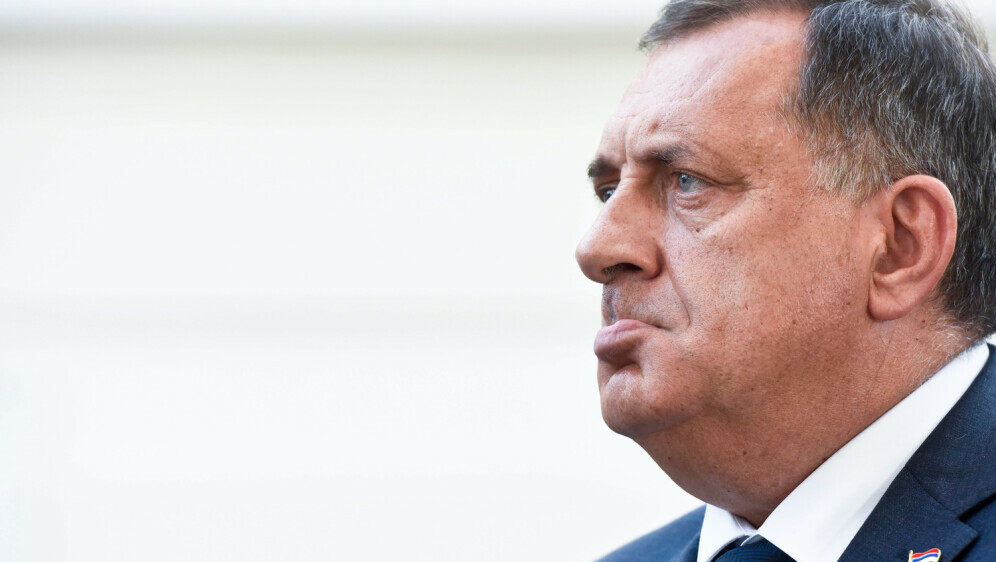President of Republika Srpska, Milorad Dodik, recently said he saw himself in 2030 “in the first mandate of the president of the independent RS”, calling on citizens to “hold firm to him and his policies”. Dodik started talking about creating a union of Serbian states, which would include Serbia, Republika Srpska and Montenegro. Since 2008, the RS president has been consistent in his rhetoric regarding RS’s secession, but it intensified after Russia unleashed aggression against Ukraine. Due to such statements, Dodik was put on the US and UK sanctions lists. Ćamil Duraković, RS Vice President, says Dodik has become too frivolous both toward himself and toward those who support him, adding that the president has been voicing some utopian statements: “He is talking today about the start of negotiations on joining the EU, and then in a few days makes a statement that he hopes to become the first president of the independent RS.” At the same time, Zoran Vuletić, President of the Civic Democratic Forum, believes Europe is not providing enough support to Bosnia and Herzegovina and that it has made big mistakes, adding that European institutions are not showing enough determination in the implementation of international decisions regarding Bosnia and Herzegovina. “If the EU, the US, and the high representative resolutely implemented the decisions of international courts, there would be much less problems in BiH, and Dodik would be responsible for the collapse of the state, the policy that led to the threat of war, encroaching on sovereignty, spreading enmity and unparalleled corruption and mafia ties,” Vuletić asserts. He notes that the Kremlin instructed Dodik to open a new, Balkan front, which Russia desperately needs. Since the money he has stolen is stored in accounts in Moscow, he is ready to push the entire region into a new whirlwind of war in order to keep the looted assets, Vuletić said. He added that Dodik can no longer survive either economically or demographically, and that it is only a matter of international will when this fact is established. At the same time, “if Dodik starts a war, then, of course, he plans to engage Serbia in this conflict. But this would not only be the end of Dodik’s existence, but would also endanger the existence of Serbia itself,” Vuletić believes, adding that he is not sure whether Serbian President Aleksandar Vučić is aware of such a threat.
The president of Republika Srpska also stated that “the West fantasizes about conducting Operation Storm in the north of Kosovo, so that the Serbs become a marginal minority that is of no interest to anyone, just as Brussels fantasizes about Operation Storm in BiH against Republika Srpska.” At the same time, he emphasized that the situation has changed, and that he would not recommend doing such things.
Thus, Dodik provocatively began to compare Western politicians’ calls for restraint as a threat to carry out Operation Storm, which was a military operation of the Croatian army run in August 1995, which led to the liberation of most of the temporarily occupied territory of Lica and northern Dalmatia , which was under the rule of the separatist entity Republika Srpska Krajina, which was supported by Serbia’s regime of Slobodan Milošević, as well as partly by the army of Bosnian Serbs operating in the neighborhood. This is an absolutely incorrect comparison on the part of Dodik, and he knows it well, but manipulation seems to have already become the essence of his policies and the way of conducting political discussions. By the way, it was the Western allies who gave the leadership in Zagreb an ultimatum to urgently end the operation when the Croatian troops reached the outskirts of Banja Luka and were ready to capture the city. It was the West that ultimately saved Bosnian Serbs from such humiliation. In the same spirit, Dodik’s statement that the Prime Minister of Kosovo, Albin Kurti, is “a reflection of the Western part of the international community, which seeks a blitzkrieg in the north of Kosovo, so that the Serbs become a marginal minority that no one cares about. This is the plan of Brussels, London, New York, and Berlin, although they will never confirm it.” The term “blitzkrieg” appeared in the vocabulary, and it should be recalled that it was initially a plan designed by Hitler’s Germany to attack and capture the Soviet Union. That is, in Dodik’s rhetoric, Hitler’s Germany is the modern-day collective West, and Stalin’s Soviet Union, which by the way together with the Third Reich started the Second World War by attacking Poland, is the Serbs in the Balkans. It is from such comparisons that it becomes clear that a number of provocative texts voiced by Dodik are drafted precisely in Moscow, where the use of lies and distorted facts is part of the Kremlin’s state policy.
Another historical manipulation that could be drafted exclusively in Moscow is that it was normal for the Germans to unite East and West Germany so the question is why Serbia and Republika Srpska were not allowed to do the same, since they are one nation. “What’s the difference? Is it that the Germans are a superior race, and we’re not?”, Dodik asks rhetorically. Of course, Republika Srpska has never been a separate state, even as an entity it has existed only since the 1990s. East Germany had as its capital the larger part of Berlin, which has been a symbol of German statehood for many centuries, and here we have Republika Srpska with Banja Luka, which was never an exclusively Serbian city. Serbian chauvinists expelled local Croats and Bosniaks from there in 1992. Dodik actually saw this with his own eyes, but for some reason he speaks of racism in European policies. Banja Luka was part of the Ottoman Empire for four centuries, and from 1867 it was part of Austria-Hungary, up until 1918. Bosnian Serbs as part of the Austro-Hungarian army fought many wars against Serbia, just as they served the Austrian emperors for years as guards of the monarchy’s borders. So Dodik’s wild comparison of Republika Srpska with East Germany is simply about historical ignorance and disdain for the European past. But Dodik couldn’t care less about this as he boldly declares that his party will be winning all elections for another 25 years. Apparently, this is exactly Dodik’s own life expectancy so he obviously seeks to remain in power for as long as he lives.
It is ambitious, but only time will tell whether it is realistic at all. We’ll see in the coming years.



